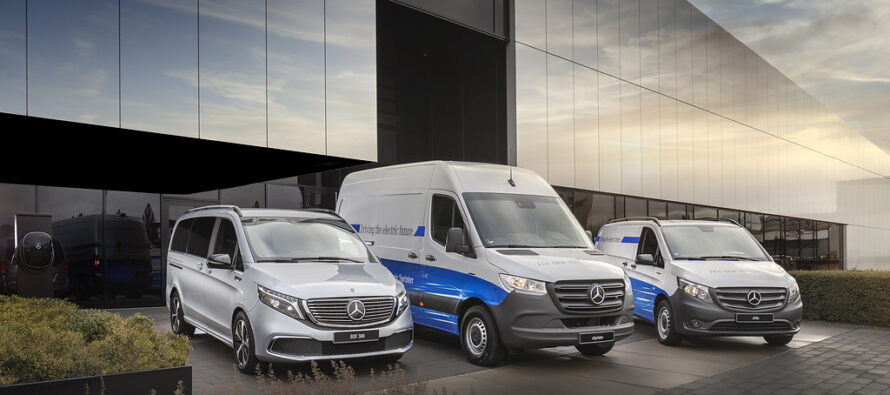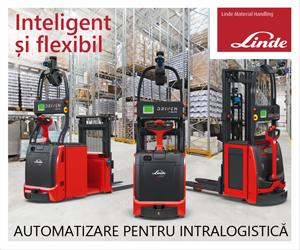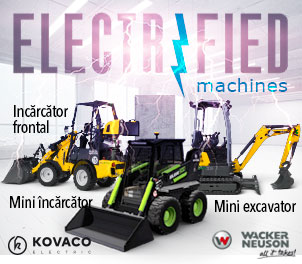Mercedes-Benz Vans accelerates electric transformation

Story Highlights
- Mercedes-Benz Vans
- VAN.EA (Van Electric Architecture)
- eSprinter
- autovehicule comerciale ușoare (LCV – light commercial vehicles)
Related Articles
Mercedes‑Benz Vans is adapting its European production setup as part of its strategy to attain leadership in electric mobility and to phase out fossil fuels. Mercedes-Benz Vans is already electrifying all of its model lines and offers all models in the mid-sized and large van segments with an electric drive. The impending availability of electric variants in the small van segment means there will soon be electric options across the entire Mercedes‑Benz Vans product line-up.
By the middle of this decade, all newly introduced vans by Mercedes-Benz will be electric only. To this end, Mercedes-Benz Vans is developing a completely new, modular, all-electric van architecture called VAN.EA. The company plans to invest in the development of this platform for purely electric medium-sized and large vans as well as in the production sites.
Although the carbon footprint of Mercedes‑Benz Vans will continue to fall, the shift to battery-electric vehicles also means a significant rise in the variable costs associated with new components. A robust and sustainable business model for the era of electric mobility, therefore, calls for new solutions in order to continue offering competitive products for our customers and to open up new long-term future prospects for our workforce.
 The company is thus adapting its production network in Europe for large all-electric vans, thereby strengthening its market position and securing the long-term prospects of its German facilities.
The company is thus adapting its production network in Europe for large all-electric vans, thereby strengthening its market position and securing the long-term prospects of its German facilities.
“We want to retain our position as the only van manufacturer producing large vans in Germany – despite the increasing costs associated with the e-mobility transformation. To achieve this, we are aligning our European production network. Incorporating an all-new production facility leveraging an existing Mercedes‑Benz site in Central/Eastern Europe into that network will help us secure the long-term competitiveness of our German plants and enable the successful transition of Mercedes-Benz Vans into the electric era”, says Mathias Geisen, Head of Mercedes‑Benz Vans.
Adaptation of European production network for large vans
The Mercedes-Benz plant in Düsseldorf is the largest Mercedes‑Benz Vans production plant, and is already building the current generation of the Sprinter and eSprinter. Soon the next generation of the eSprinter will roll off the production line. Looking to the future, the open body styles (platform for body builders or flatbeds) of the large VAN.EA will be built there. The planned investments to make the necessary adaptations at the plant total around 400 million euros.
The Mercedes‑Benz plant in Ludwigsfelde has been building the open body type of the current Sprinter generation since 2018. The next generation of the eSprinter (open model) will also be produced in this plant soon. Beyond this, the company is also considering establishing the Ludwigsfelde plant as a competence centre for the individualisation of electric vans.
The adaptation of the production network for large all-electric vans will see an established plant from the Mercedes-Benz AG production network based in Central/Eastern Europe incorporated into the Mercedes‑Benz Vans production network. In the future, the large vans (closed model/panel van) based on VAN. EA basis will be produced here. Through this move, Mercedes-Benz Vans wants to take advantage of cost benefits that will enable it to secure its long-term competitiveness.
Discussions on the plans in Germany are scheduled to commence shortly between company management and employee representatives. The implementation of the respective plans will be carried out locally and is subject to the agreement of all relevant boards for this step following the successful completion of negotiations.
 Mercedes-Benz Vans and Rivian sign Memorandum of Understanding
Mercedes-Benz Vans and Rivian sign Memorandum of Understanding
Mercedes-Benz Vans and Rivian have signed a Memorandum of Understanding for a strategic partnership. The companies intend to establish a new joint venture manufacturing company with the purpose of investing in, and operating, a factory in Europe to produce large electric vans for both Mercedes‑Benz Vans and Rivian, starting in a few years. The target is to build an all-new electric-only production facility leveraging an existing Mercedes‑Benz site in Central/Eastern Europe. With this cooperation, Mercedes‑Benz Vans is taking another step in its transformation into a manufacturer of exclusively electric vans and strengthening its long-term market position.
Next generations of large electric vans
Mercedes-Benz Vans is continuously developing its current models. With three battery variants and multiple body styles ranging from panel van to chassis cabs for box bodies, the next-generation eSprinter aims not only to capture new customer segments but also new markets, including the USA and Canada. Depending on the configuration, range will be more than twice that of the current eSprinter. Preparations are currently underway for the phased production of the next generation of the eSprinter, that will commence in the second half of next year at the plants in Charleston, Düsseldorf and Ludwigsfelde.
With its new VAN.EA (Van Electric Architecture), Mercedes-Benz Vans is accelerating its transformation into a provider with an exclusively electric product line-up. VAN.EA provides the basis for all electric vans brought to market by Mercedes-Benz in the mid-size and large segments as of 2025.






